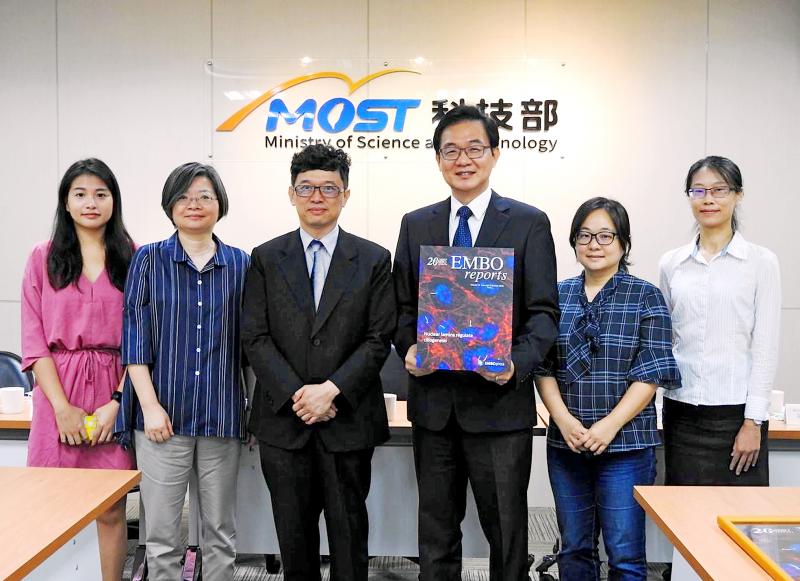Researchers have found that a deficiency in the primary cilium on cells could be the key to understanding progeria, a rare progressive genetic disorder that causes children to age rapidly and die young.
The research was featured on Monday last week in EMBO Reports, a peer-reviewed journal published by the European Molecular Biology Organization, under the title “Lamin A-mediated nuclear lamina integrity is required for proper ciliogenesis.”
People with progeria, also known as Hutchinson-Gilford progeria syndrome, develop symptoms in infancy and have an average life expectancy of 13 years.

Photo courtesy of the Ministry of Science and Technology
Clinically observable traits include severe growth retardation, loss of subcutaneous fat, wrinkled skin, hair loss, osteoporosis, joint stiffness and cardiovascular disease.
Despite being medically described in 1886, progeria was not attributed to mutations of the LMNA gene until 2003. The gene provides instructions to make several slightly different proteins called lamins.
The two major proteins produced from this gene — lamin A and lamin C — are made in most cells.
When the LMNA gene mutates, it causes abnormal wrinkles on the nucleus, which can deform and hollow out, Chen Hong-chen (陳鴻震), professor of molecular biology at National Yang-Ming University and leader of the research team, told a news conference at the Ministry of Science and Technology yesterday.
For the first time, the team found a link between the abnormality in the nucleus and the primary cilium on the surface of the cell, after observing that dermal fibroblasts — which generate connective tissue — had fewer and shorter primary cilia in people with progeria.
As the primary cilium functions like a cellular antenna that detects changes in the extracellular environments and transduces signals to the cell interior to respond to those changes, it is possible that the malfunction of primary cilia could cause progeria, Chen said.
The team further examined LMNA-null laboratory mice — which have had a gene knocked out by the targeted integration of a defective gene — and proved that primary cilia were defective in many organs of prematurely aged, lamin A-deficient mice, he said.
The team also found that mice with LMNA deficiency had a lifespan of four to five months, much shorter than normal mice.
It is possible to fix the deficiency with genetic engineering, Chen said.
“This discovery not only provides new insight into the pathogenesis of progeria syndrome, but also sheds light on new therapeutic strategies for related diseases,” the ministry said in a statement.
The study was sponsored by the ministry and mainly conducted by postdoctoral fellow Fan Jia-rong (范嘉榕), who is the first author of the paper; associate researcher Chi Ya-hui (紀雅惠) of the National Health Research Institutes; and You Li-ru (游麗如) and Wang Won-jing (王琬菁) of the university’s Institute of Biochemistry and Molecular Biology.

CALL FOR SUPPORT: President William Lai called on lawmakers across party lines to ensure the livelihood of Taiwanese and that national security is protected President William Lai (賴清德) yesterday called for bipartisan support for Taiwan’s investment in self-defense capabilities at the christening and launch of two coast guard vessels at CSBC Corp, Taiwan’s (台灣國際造船) shipyard in Kaohsiung. The Taipei (台北) is the fourth and final ship of the Chiayi-class offshore patrol vessels, and the Siraya (西拉雅) is the Coast Guard Administration’s (CGA) first-ever ocean patrol vessel, the government said. The Taipei is the fourth and final ship of the Chiayi-class offshore patrol vessels with a displacement of about 4,000 tonnes, Lai said. This ship class was ordered as a result of former president Tsai Ing-wen’s (蔡英文) 2018

‘SECRETS’: While saying China would not attack during his presidency, Donald Trump declined to say how Washington would respond if Beijing were to take military action US President Donald Trump said that China would not take military action against Taiwan while he is president, as the Chinese leaders “know the consequences.” Trump made the statement during an interview on CBS’ 60 Minutes program that aired on Sunday, a few days after his meeting with Chinese President Xi Jinping (習近平) in South Korea. “He [Xi] has openly said, and his people have openly said at meetings, ‘we would never do anything while President Trump is president,’ because they know the consequences,” Trump said in the interview. However, he repeatedly declined to say exactly how Washington would respond in

WARFARE: All sectors of society should recognize, unite, and collectively resist and condemn Beijing’s cross-border suppression, MAC Minister Chiu Chui-cheng said The number of Taiwanese detained because of legal affairs by Chinese authorities has tripled this year, as Beijing intensified its intimidation and division of Taiwanese by combining lawfare and cognitive warfare, the Mainland Affairs Council (MAC) said yesterday. MAC Minister Chiu Chui-cheng (邱垂正) made the statement in response to questions by Democratic Progressive Party (DPP) Legislator Puma Shen (沈柏洋) about the government’s response to counter Chinese public opinion warfare, lawfare and psychological warfare. Shen said he is also being investigated by China for promoting “Taiwanese independence.” He was referring to a report published on Tuesday last week by China’s state-run Xinhua news agency,

‘NOT SUBORDINATE’: Only Taiwanese can decide the nation’s future, and people preserving their democratic way of life is not a provocation, President William Lai said Taiwan does not want China’s “one country, two systems,” and must uphold its freedom and democracy as well as resolve to defend itself, President William Lai (賴清德) said yesterday, rejecting Beijing’s latest bid to bring the country under Chinese control. The president made the remarks while attending a commissioning ceremony for Taiwan’s first battalion of M1A2T Abrams tanks in Hsinchu County’s Hukou Township (湖口). The tanks are made by General Dynamics, a major US defense contractor. China this week said it “absolutely will not” rule out using force over Taiwan, striking a much tougher tone than a series of articles in state media